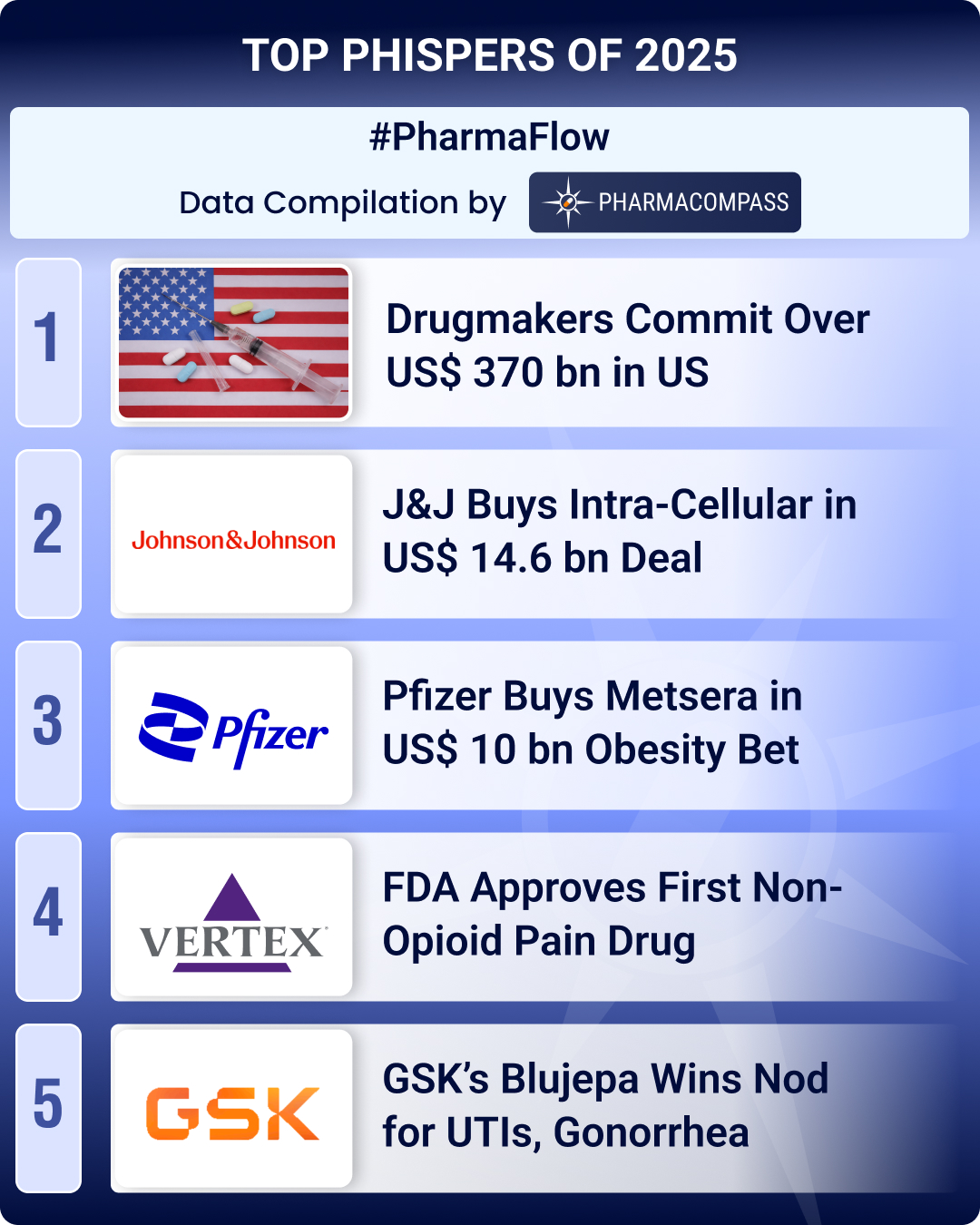
By PharmaCompass
2023-11-16
Impressions: 1,634 Article || 1 Video
This week’s Phispers is packed with updates on the weight management market, which is witnessing a lot of action. After the approval of Eli Lilly’s Zepbound, Novo Nordisk has been swift in announcing a phase 3 head-to-head trial of this drug with its obesity candidate CagriSema. It has also announced an investment of US$ 6 billion in expanding its manufacturing capacity for Wegovy and Ozempic.
AstraZeneca is the latest entrant in the weight loss market — it has announced a potential US$ 2 billion deal with Chinese drugmaker Eccogene to license its experimental obesity pill ECC5004.
In other deals, Bayer has partnered Recursion Pharmaceuticals in a US$ 1.5 billion drug discovery collaboration for precision oncology, while Japan’s Ajinomoto is acquiring Forge Biologics for around US$ 554 million.
Meanwhile, the US has put pressure on China to stop flow of fentanyl, a deadly opioid.
FDA has approved Valneva’s single-shot chikungunya vaccine Ixchiq. And, in a mid-stage trial, Anthos Therapeutics’ investigational anticoagulant, abelacimab, has outperformed Bayer’s Xarelto.
Novo plans capacity expansion in Denmark; head-to-head trial with Lilly’s Zepbound
Soon after Eli Lilly launched its weight management drug Zepbound (tirzepatide), its arch rival Novo Nordisk has announced a head-to-head phase 3 trial comparing Zepbound with its experimental drug CagriSema (a combo of its weight loss drug Wegovy with experimental long-acting amylin analog cagrilintide). The study will enroll 800 patients, and is likely to be completed in the second half of 2025. Seven months back, Lilly had launched a similar study between Zepbound and Wegovy.
Novo, Lilly to expand capacities: Both Novo and Lilly are planning to expand their manufacturing capacities in order to capitalize on the burgeoning market for weight loss drugs. Novo is spending over Danish kroner 42 billion (US$ 6 billion) to boost production in Kalundborg, Denmark. Through this expansion, Novo will produce more active pharmaceutical ingredients (APIs), such as semaglutide (used in both Wegovy and its diabetes med Ozempic).
Similarly, a Reuters report says Lilly is planning to set up a new plant in western Germany. Lilly has said it would unveil “far-reaching investment plans” at a news conference, scheduled to be held later this week.
Several countries are facing a shortage of Wegovy and Ozempic. Diabetes med Ozempic is increasingly being prescribed “off-label” to treat weight loss as it has the same API as Wegovy. This week, Belgium decided to temporarily ban the use of Ozempic as a weight loss treatment amid shortages. Britain had also instructed doctors to stop prescribing Ozempic to people who don’t have type 2 diabetes. Similarly, the German drug regulatory authority is considering a prohibition on the export of Ozempic.
Astra licenses Eccogene’s drug candidate to treat obesity, diabetes
Seeing the success of Novo Nordisk and Eli Lilly’s drugs, AstraZeneca has placed a potential US$ 2 billion bet on the booming market for weight management. It has entered into an exclusive license agreement with Chinese biopharma Eccogene for its investigational treatment — ECC5004 — to treat obesity, type-2 diabetes and other cardiometabolic conditions.
AstraZeneca believes this pill could cause fewer side effects than the current injectable treatments. Astra will pay Eccogene US$ 185 million upfront, and up to US$ 1.825 billion in milestone payments.
Meanwhile, AstraZeneca’s cancer drug Imfinzi given along with chemoradiotherapy (CRT) has failed to meet its main goal in a late-stage trial to treat unresectable, stage 3 non-small cell lung cancer (NSCLC).
Bayer, Recursion collaborate on US$ 1.5 billion oncology research
Bayer has tied up with clinical-stage TechBio company Recursion Pharmaceuticals to work on novel therapeutic targets for precision oncology. The drug discovery research partnership is valued at up to US$ 1.5 billion. The partners have the potential to initiate as many as seven oncology programs.
Ajinomoto to acquire Forge Biologics: Japan’s Ajinomoto will acquire Forge Biologics Holdings for JPY 82.8 billion (US$ 554 million). The acquisition will enhanceAjinomoto’s capabilities in adeno-associated virus (AAV) and plasmid gene therapy manufacturing, thereby diversifying and reinforcing its contract development and manufacturing organization (CDMO) services.
Autifony, Jazz in drug development deal: Autifony Therapeutics has entered into an exclusive global licensing agreement with Jazz Pharmaceuticals for up to US$ 770.5 million to discover and develop drug candidates targeting two different ion channel targets associated with neurological disorders.
US puts pressure on China to stop flow of fentanyl, to counter narcotics trade
Chinese President Xi Jinping’s historic visit to the United States is seeing some action on the pharma sector as well. According to The New York Times, US President Joe Biden has put pressure on Xi Jinping to crack down on the Chinese facilities that are helping in the production of fentanyl, an opioid that can be 100 times as potent as morphine and has caused thousands of deaths in the US. Biden also outlined a plan to work with China to counter the narcotics trade.
Pfizer to axe 500 in Kent, UK: As part of its US$ 3.5 billion cost-cutting initiative, Pfizer plans to eliminate 500 positions at its Sandwich, Kent location in the UK.
FDA approves first chikungunya vaccine from Valneva; okays Takeda’s Adzynma
FDA has approved Valneva’s single-shot vaccine, Ixchiq, for individuals 18 years and older who are at increased risk of exposure to the chikungunya virus, making it the first preventative chikungunya vaccine in the US. The decision is based on late-stage trials that proved the vaccine triggered antibody levels capable of neutralizing the virus in 98.9 percent of participants.
The agency has also approved Takeda's therapy, Adzynma, the first treatment available to adult and pediatric patients with congenital thrombotic thrombocytopenic purpura (TTP), a rare genetic blood disorder.
Concerns over Merck’s gefapixant: FDA staff has raised concerns that data on Merck’s chronic cough drug gefapixant might not be enough to prove meaningful benefit. The agency had declined to approve the drug in January last year. A panel of expert advisers to the FDA is set to meet on November 17 to discuss the efficacy of gefapixant. Currently, there are no approved therapies for chronic cough in the United States.
Anthos’ blood thinner outperforms Xarelto: Anthos Therapeutics’ investigational anticoagulant, abelacimab, has substantially cut the risk of bleeding by 67 percent in patients with atrial fibrillation compared to Bayer’s Xarelto (rivaroxaban) in a mid-stage safety study.
The PharmaCompass Newsletter – Sign Up, Stay Ahead
Feedback, help us to improve. Click here
Image Credit : Phisper Infographic by PharmaCompass license under CC BY 2.0
“ The article is based on the information available in public and which the author believes to be true. The author is not disseminating any information, which the author believes or knows, is confidential or in conflict with the privacy of any person. The views expressed or information supplied through this article is mere opinion and observation of the author. The author does not intend to defame, insult or, cause loss or damage to anyone, in any manner, through this article.”







